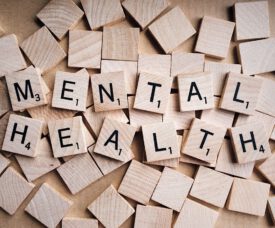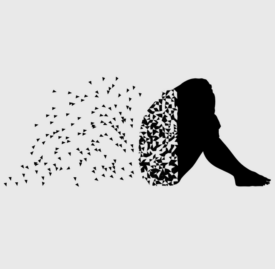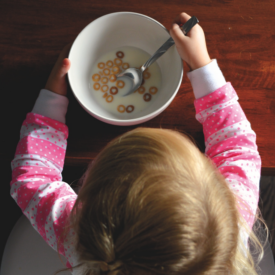Gut microbes and mental health disorders
Mental health disorders include mood disorders, such as depression or anxiety, and psychotic conditions, like bipolar disorder or schizophrenia. The search for new therapeutical approaches is needed for these disorders and emerging research is focusing on the gut microbiota as a novel target. Gut microbiota, consisting of a large population of different microorganisms, affect the brain and play an important role on mental health disorders. The composition of the gut microbiota is dynamic and influenced by the diet. Therefore, the gut microbiota could be targeted as part of new treatments for these disorders. Bacteria of the gut microbiota produce different...
Diet as a mediator between health and disease
In humans, many biological processes such as instincts, emotions and behaviour, are interconnected to guarantee survival. This understanding was already mentioned many centuries ago. In ancient Greece, the physician Hippocrates (400BC) defined the importance of the balance between the human body and environment; what we eat, what we feel and our behaviour (emotions) according to the person’s personality (genetics) or character. This balance leads to well-being, health, and happiness, while an imbalance leads to illness [1]. Today, centuries after the postulates of Hippocrates, the field of medicine can give a biological explanation to the reasoning of the Greek philosopher. Humans...
The pros and cons of collecting data through self-report questionnaires
Data used in scientific research take on many different forms and are collected in multiple ways. One method I use in my research is collecting data from self-report questionnaires. This helps me to study whether a mother’s diet during pregnancy can be linked to impulsive or compulsive behavioural traits in her children. In this blog, I will explain to you the benefits of using such questionnaires, but also some of the limitations such data have. In medical research, self-report questionnaires are frequently used to collect data. They have several advantages. In general, they are inexpensive and simple to administer, making...
How to prevent digital addictions during lockdown
To contain the spread of the Corona-Virus, governments all around the world have introduced measures such as “lockdown“, school closures, restriction of the number of contacts, and “stay at home” orders. Many of the measures affect especially children and families and threatens their well-being. Digital media are essential for homeschooling, maintaining social contacts or getting information. In addition, digital media (e.g. video gaming) are often used to cope with negative emotions. A study during the first lockdown in Germany indeed revealed an increase in video gaming time in a representative sample of children and adolescents of up to 75%. Their...
Why diet can be such a delicate topic
All day and every day, we are surrounded by food. At the same time, our own food intake can be quite a sensitive topic. Friendly conversations about what’s a healthy diet can easily turn into heated arguments, and many of us feel uncomfortable sharing exactly what we eat and drink. When asked, many people are happy to report their veggies but not that unintended late-night chocolate ice cream. Some prefer to eat when they are alone, or even eat in secret. Unless someone is close to us, we tend not to question or comment on someone’s dietary choices. How come...
Why do we snack? Reasons for healthy and unhealthy snacking
What we eat between meals, we usually call a snack. Snacks can be all kinds of foods, but they often differ from main meals in what they contain, portion size, consumption time, and place as well as why they`re eaten [1][2]. If you’re someone who likes to snack, I am probably not telling you anything new. While main meals are mostly eaten because of hunger or habit of eating at a certain time, the reasons why people eat snacks show more variation [1][3]. Most of us have experiences with eating even when not being really hungry. People snack because they...
How does microbiota influence mental health?
The number of patients with mental disorders worldwide is increasing. Therefore, more and more research is focussing on understanding the causes of these diseases and developing better treatments. One key factor that we are studying in this context is the microbiota that live in the gut. This new approach arises because gut microbiota influences various normal mental processes. When these mental processes don’t function well, this can cause mental disorders [1]. It is currently known that when the microbiota are not well developed, disturbed, or harmed, dysfunction can appear in the digestive system, immune system, endocrine system, nervous system, and...
The relationship between inflammation and depression: possibilities for new, personalized treatments
Why is inflammation relevant for depression?In the ongoing search for causes and new treatments for Major Depression (MD), the link between inflammation and depression has gained considerable attention. In short, inflammation is one of the most potent immune system’s responses to an imbalance in the environment. Lifestyle variables, such as stress, nutrition, or body weight can trigger or attenuate inflammation. They are therefore important for keeping the body and its (cellular) environment in balance, a process called “homeostasis” [1]. While some level of inflammation is part of a normal immune response and is in fact crucial to survival, a form...
The Relationship Between Sleep and ADHD
Most of you know and recognize that a short night of sleep does not make you feel well. After sleeping a short night, you wake up less rested and this affects your mood and behavior. You might be less focused and perform not as good at school or at work as you usually do. Sleep has been studied widely, but we still do not understand exactly what the function of sleep is. But we do know what happens if we do not sleep enough. For instance, research has shown that shorter sleep is connected to worse school performance and more...
What is your three-year-old eating?
Part of my research aims to investigate the role of nutrition on the impulsive behavior of three-year-olds. Nutrition has been linked to inhibitory control (the ability to suppress impulses), but not all evidence is very clear or consistent [1]. One of the reasons is because previous studies have used different methods to investigate nutritional intake. There are different methods of assessing nutritional intake, such as a 24-hour recall (dietary intake of the past 24 hours is assessed), a food diary (dietary intake is recorded in a diary), or a food frequency questionnaire (the participant fills in a list of food...









